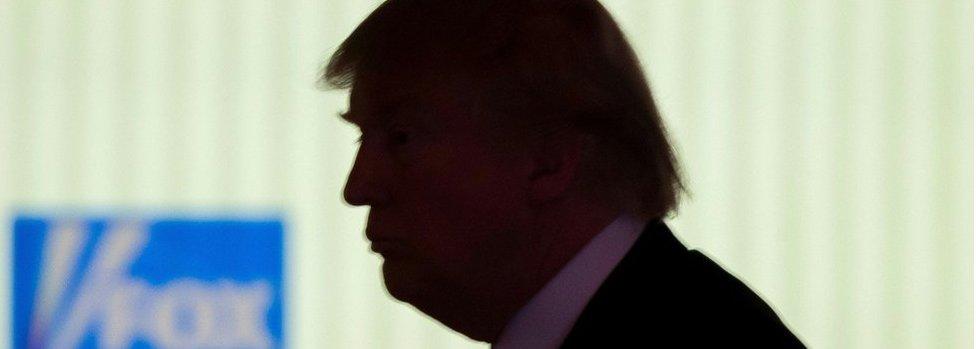US election 2016: Donald Trump under attack from debate rivals
- Published

Four Republicans remain in the race
Presidential contender Donald Trump has come under attack from his rivals at a Republican debate, after a day in which the party's veteran politicians urged voters to desert him.
The front-runner in the Republican race was on the defensive in Detroit as Marco Rubio and Ted Cruz piled in.
In a testy debate, Mr Trump admitted he had changed his stance on issues but said flexibility was a strength.
Senior Republicans say Mr Trump is a liability who would lose the election.
The debate began with Mr Trump being asked about an attack earlier in the day by Mitt Romney, the 2012 nominee, who accused the businessman of bullying, greed and misogyny. Mr Trump dismissed Mr Romney as a "failed candidate".
US election 2016: Super Tuesday results
Ohio Governor John Kasich was the fourth Republican contender to take part in Thursday's debate.
Donald Trump has broadened his appeal
Leading the attack on Mr Trump, Florida Senator Marco Rubio said he was "not going to turn over the conservative movement to someone who thinks the nuclear triad is a rock band from the 1980s".
In one of the most bizarre moments, Mr Trump defended the size of his hands and then quipped about another part of his anatomy.
There were plenty of personal insults from Mr Trump, who labelled the Florida senator "little Rubio" and the senator from Texas as "liar Ted".

Analysis by Laura Bicker, BBC News, Washington

The debate, like the campaign itself, was dominated by one man
Since Super Tuesday, Donald Trump has faced relentless, withering criticism from his own party.
He was challenged on his various policy changes, on his failed businesses, on his support for Democrats.
He told the audience he reserved the right to be "flexible" and change his mind on issues if he felt like it. He was shown tapes of all the times he'd done just that.
The mud-slinging continued and at one point Ted Cruz urged Mr Trump to "breathe, breathe, breathe". But it is the Republican Party who appear to be gasping. They are trying to stop the front-runner, fearing he will destroy the party. The problem is Trump supporters have so far proved to be loyal no matter what is flung at their man.

The New York businessman was forced to explain a civil lawsuit involving the collapse of Trump University.
He said he would win the case but Mr Rubio said he was trying to "con people into giving him their vote, just like he conned people into giving him their money".
Mr Trump was also challenged by the Fox News panel for changing his stance on Syrian refugees, the war in Afghanistan and President George W Bush.
He replied: "I have a very strong core. But I've never seen a successful person who wasn't flexible, who didn't have a certain degree of flexibility."
The debate, sponsored by Fox News, brought Mr Trump face to face with presenter Megyn Kelly, whom he dismissed as a "bimbo" after they clashed in the first primary debate.
This time he was all smiles and he complimented her looks when he took her first question.
Other debate highlights:
All three of Mr Trump's rivals said they would back him if he won the nomination
Mr Trump was pressed to move his clothing manufacturing back to the US from China and Mexico
Mr Kasich said he was the "grown-up" on the stage who had the best chance against Democrat Hillary Clinton
Using a big screen with graphics, Fox host Chris Wallace challenged Mr Trump on whether his planned savings added up
Texas Senator Mr Cruz said Mr Trump was part of a corrupt Washington system, funding Mrs Clinton's 2008 election campaign
Mr Trump justified waterboarding of "animals in the Middle East" and the killing of the families of terrorists
The Romney-Trump bromance turned sour
Face to face
Hours earlier, Mr Romney led growing calls by leading Republicans against a Trump nomination.
Calling him a "phony" and a "fraud", the former standard-bearer of the party said Mr Trump's policies - like the deportation of undocumented migrants and banning Muslims from entering the US - would make the world less safe.
Others like Paul Ryan, John McCain and a host of national security committee members have also attacked the New Yorker.
Republicans in four states - Kansas, Kentucky, Louisiana and Maine - go to the polls on Saturday. The billionaire has won 10 of the 15 states that have voted so far, with his promise to "make America great again".
His supporters value his perceived authenticity and business acumen, and say he is the strong leader the country needs.
With the effective departure of Ben Carson this week, the field of Republican candidates - once 17-strong - has now been narrowed to four.
In the Democratic race, Hillary Clinton has 10 states, five more than rival Bernie Sanders.
The two will take to the debate stage in Flint, Michigan, on Sunday.
Election calendar: Next races
5 March: Kansas caucuses, Louisiana primary, Kentucky and Maine caucuses (Republican), Nebraska caucuses (Democratic)
6 March: Maine caucuses (Democratic)
8 March: Hawaii and Idaho caucuses (Republican), Idaho primary (Republican), Michigan and Mississippi primaries
15 March: Florida, Illinois, Missouri, North Carolina, Ohio primaries